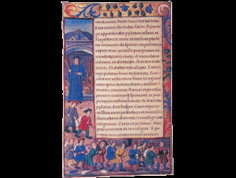

Historical analysis of discourse on the development and transformation of teaching concepts in the West
Words express thought. Research on educational thought is a historical analysis of discourse that has evolved around the word education. It can also be referred to as a genealogical attempt to clarify the development and transformation of concepts that support educational thought. These include ability, development, learning, teachers/students, mental/physical aspects, and intellectual/moral/physical training. This research group seeks to clarify the uses, contextual factors and positional relationship of educational concepts based on the examination of literature, both well-known and unknown.
Even words we utter spontaneously are classified into certain categories. A look at who said certain words, when s/he said them and in what context gives us a glimpse of a different dimension. Research on educational thought involves reviewing the obvious nature of education through historical examination of words. It also involves considering education through “humane literacy,” or “the great discourse with the living dead which we call reading,” as described by George Steiner.
Professor SHIROZU, Hironobu
The starting point of my research was the analysis of the concept of police in the 18th century, which helped me associate education more closely with government. The concept of police involves an internal affairs function, which governs life (including security, hygiene and poverty relief). The concept of public education was also developed as a policing function in consideration of both security and welfare. Today, government practitioners involved with education and welfare still receive a subtle influence from this policing function.
For the past several years, I have worked to re-examine, from the viewpoint of the history of thought, the genealogy of government-related concepts, and the development and transformation of related educational discourse. How did monarchs, clergypersons or government officials come to believe that all men should be governed? When and against what historical background did education, which seeks to transform human beings, come to play a part in treatises of government as the art of arts (or ars atrium in Latin)? Literature on the modern concept of police has revealed that the term education meant nourishing and raising children, namely, fostering life, and that the term’s usage changed when it began to be used in the treatises of government in Western Europe around the 15th century. It was also found that by the 19th century, a popular belief spread that education originally meant drawing out human ability, particularly mental competence.
Today, human activities are measured and analyzed to show levels of competence, technologies purported to enhance the capabilities of humans proliferate, and educational thought endlessly evolves as discourse on competence. To deconstruct the modern discourse on education, I hope to delve into the depths of education by going against the current of the times, and to conduct basic studies on educational thought that would reorient education as an activity to foster life.